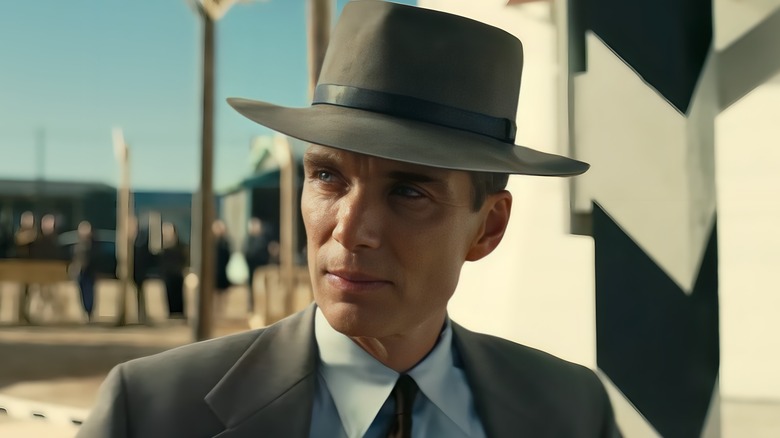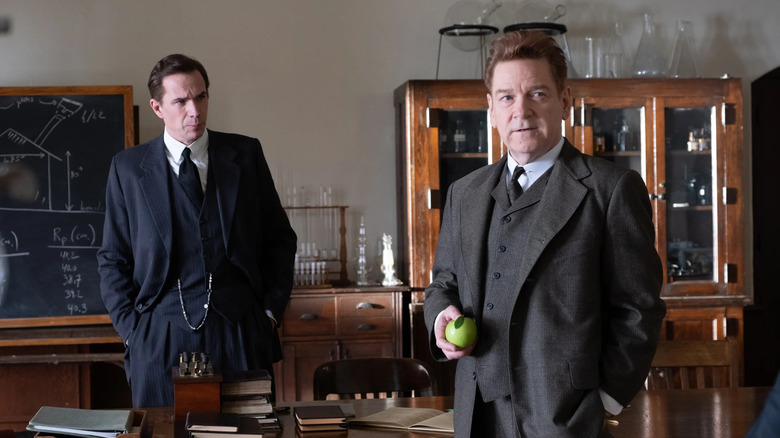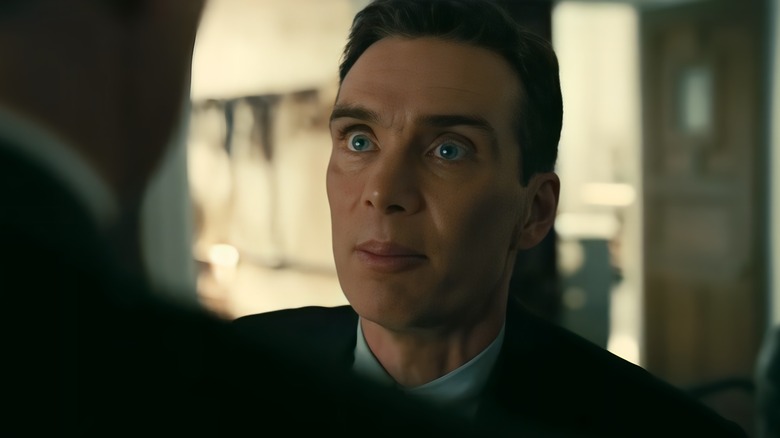Oppenheimer's Grandson Identifies The One Controversial Scene He'd Change
"Oppenheimer" is a biopic of the life and times of its titular character, Julius Robert Oppenheimer (Cillian Murphy), and director Christopher Nolan put significant effort into the accuracy of his latest project. He even told the Washington Post that he literally hopped the fence of Oppie's Los Alamos home while scouting locations early in the production process. Since its release, everyone has been busy dissecting the various details of the film at great length, analyzing the accuracy of everything from stars on flags to era-specific cigarette packs.
One group that has an understandably loud voice in the critical process is Oppenheimer's descendants. His grandson, Charles Oppenheimer, shared his thoughts on the film with Time, including which scene he would have cut. Charles, who didn't see the movie until it was released, challenged that the moment when Oppenheimer nearly poisons his professor Patrick Blackett (James D'Arcy) with an apple is not grounded in historical fact.
"As a dramatized representation of the history, it was really largely accurate," Charles began, "There are parts that I disagree with, but not really because of Nolan." Shortly after this, the grandson added that he blames the troublesome scene on the 2005 biography that inspired the film.
"The part I like the least is this poison apple reference, which was a problem in 'American Prometheus,'" he said, clarifying that the scene is clearly unsubstantiated in the book. "There's no record of him trying to kill somebody. That's a really serious accusation and it's historical revision. There's not a single enemy or friend of Robert Oppenheimer who heard that during his life and considered it to be true."
The role of Oppenheimer's descendants in Nolan's film
While Charles Oppenheimer's opinion is significant due to his biological connection to his grandfather, he wasn't close to the man himself. In fact, Charles was born near Santa Fe, New Mexico, but not until after both of his paternal grandparents had passed away.
Charles told Time that despite his late arrival, the family had a very open dialogue about his grandfather's connection to Charles' own father, Peter Oppenheimer, who even spent several years of his childhood living on-scene in Los Alamos while the Manhattan Project was underway.
Despite their closeness to the story, Charles explained to Time that the family's basic policy toward what they call "the cult of Oppenheimer" is to stay hands-off. "It's a business to write and talk about Oppenheimer," Charles said, "and the model that my dad chose is: 'It's not very classy, and I'm not going to be involved in publicly representing Oppenheimer in ways that other people do as a business.'"
Charles did briefly talk to Nolan during the production, and although, in retrospect, he didn't love the apple scene, he ultimately was content to let Nolan tell the story the way he wanted. "I definitely would have removed the apple thing," Charles said. "But I can't imagine myself giving advice about movie stuff to Nolan. He's an expert, he's the artist, and he's a genius in this area. But one amusing family story is that, if I invited myself to the set, they would entertain me coming, which I did twice." It was during one of these visits that one other noteworthy historical inaccuracy bubbled up to the surface.
Oppie's swearing in the movie had his real-life family worried
Charles Oppenheimer visited the "Oppenheimer" set twice during filming. One of these visits was in New Mexico, and the grandson witnessed the filming of a scene where Cillian Murphy enters a room and delivers a line that includes the word "a******." As Charles told Time, "And when I went back to Santa Fe and told my dad, he was horrified. He said, 'Robert Oppenheimer never swore. He was such a formal person. He would never, ever do that.'"
Despite private worries that "Oppenheimer" would feature an over-the-top portrayal of its eponymous character, Charles chalked the event up to the creative liberty that comes with any adaptation. All the same, the family was nervous that the film might have a slightly more colorful take on their ancestor than they would have liked. Then the movie came out, and their anxiety proved groundless.
"Anyway," Charles said, "I think he said one swear word in the movie and I just happened to be in the room. So there is a chance that if we had been consultants, we could have added some details and depth. But there's such a complete record. It was enough for Nolan to tell the story he intended to." Based on the feedback from most people coming out of theaters so far, we would agree with the grandson's conclusion.


